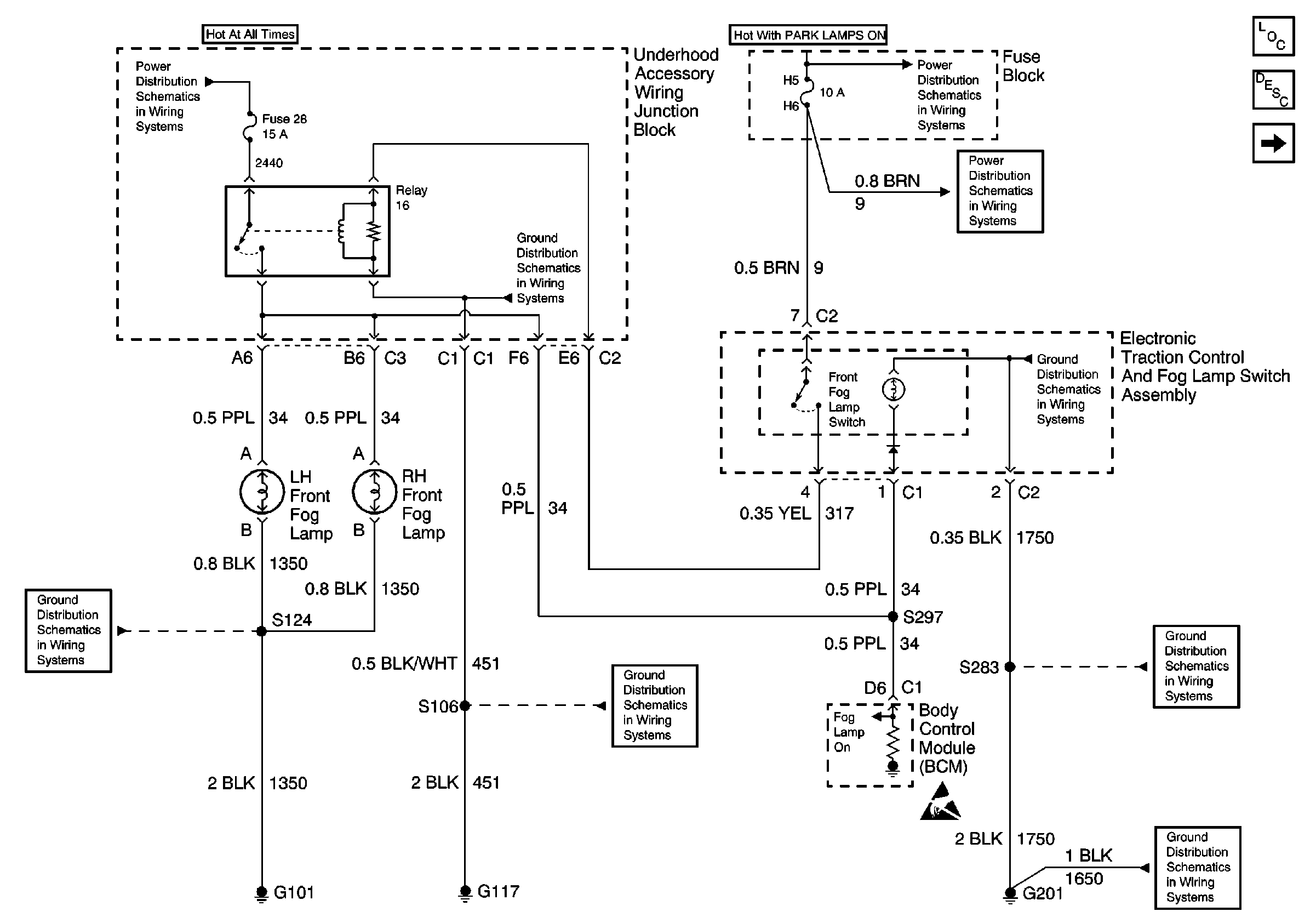Refer to
Front Fog Lamps, Fog Lamp Relay, Front Fog Lamp Switch
and BCM

.
Circuit Description
The body control module (BCM) controls the fog lamp relay. The BCM receives an input from the fog lamp switch input circuit and then energizes the fog lamp relay by grounding the fog lamp relay coil control circuit. The BCM will only ground the fog lamp relay coil control circuit if the following conditions exist:
| • | The ignition switch must be in the RUN position. |
| • | The headlamp switch must be in the Park or Headlamp ON position. |
| • | The headlamp dimmer switch must be in the LOW-BEAM position. |
Conditions for Running the DTC
The BCM must be commanding the fog lamp relay to energize.
Conditions for Setting the DTC
| • | The BCM detects a short to battery in the fog lamp enable relay coil control circuit when the BCM is trying to energize the fog lamp relay. |
| • | The condition above must be present for more than 0.3 seconds. |
Action Taken When the DTC Sets
| • | The BCM stores DTC B2533 in memory. |
| • | The SERVICE VEHICLE SOON telltale illuminates. |
Conditions for Clearing the DTC
| • | A current DTC B2533 will clear if the short to battery in the fog lamp relay enable coil control circuit is no longer detected by the BCM. |
| • | A history DTC B2533 will clear after 100 consecutive ignition cycles if the condition for the malfunction is no longer present. |
Diagnostic Aids
| • | If the DTC B2533 is a history DTC, the fault may be intermittent. Refer to Testing for Intermittent Conditions and Poor Connections . |
| • | The following conditions may cause an intermittent malfunction to occur: |
| - | An intermittent short to battery in the fog lamp relay enable coil control circuit |
| - | The fog lamp relay coil is intermittently shorted to battery internally. |
| - | The BCM is intermittently shorted to battery internally. |
Test Description
The number(s) below refer to the step number(s) on the diagnostic table.
-
Listen for an audible click when the fog lamp relay operates. Command both the ON and OFF states. Repeat the commands as necessary.
-
Test for voltage at the coil side of the fog lamp relay.
-
This step verifies that the body control module (BCM) is proving ground to the fog lamp relay
-
This step tests for a short to B+.
Step | Action | Value(s) | Yes | No |
|---|---|---|---|---|
1 | Did you perform the Lighting Systems Diagnostic System Check? | -- | Go to Step 2 | |
Does the scan tool display OFF? | -- | Go to Step 3 | Go to Step 4 | |
Does the front fog lamp relay parameter change state? | -- | Go to Diagnostic Aids | Go to Step 4 | |
Does the scan tool display OFF? | -- | Go to Step 7 | Go to Step 5 | |
Test the signal circuit of the fog lamp relay enable output for a short to B+. Refer to Circuit Testing and Wiring Repairs in Wiring Systems. Did you find and correct the condition? | -- | Go to Step 10 | Go to Step 6 | |
6 | Inspect for poor connections at the harness connector of the body control module. Refer to Testing for Intermittent Conditions and Poor Connections and Connector Repairs in Wiring Systems. Did you find and correct the condition? | -- | Go to Step 10 | Go to Step 8 |
7 | Inspect for poor connections at the harness connector of the fog lamp switch. Refer to Testing for Intermittent Conditions and Poor Connections and Connector Repairs in Wiring Systems. Did you find and correct the condition? | -- | Go to Step 10 | Go to Step 9 |
8 |
Important: Perform the setup procedure for the body control module. Replace the body control module. Refer to Body Control Module Replacement in Body Control System. Did you complete the repair? | -- | Go to Step 10 | -- |
9 | Replace the fog lamp switch . Refer to Fog Lamp Switch Replacement . Did you complete the repair? | -- | Go to Step 10 | -- |
10 |
Does the DTC reset? | -- | Go to Step 2 | System OK |
